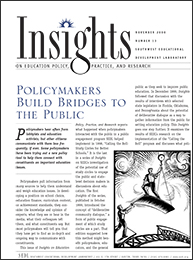Implications for Public Education
The challenges to policymaker satisfaction in study circles can be overcome in communities intent on forging a stronger connection between policymakers and the public on issues of public education.
Policymakers who took part in study circles were overwhelmingly positive about the potential of this process to bridge the gap between state education policies and the schools and communities that such policies affect. Study circles, they suggested, could create broader input for decision making by opening up the lines of communication between policymakers and their constituents. Such community dialogues could increase support for public education by providing a means of bringing education initiatives into alignment with community priorities and creating an atmosphere of trust and credibility. Moreover, they might foster civic participation and school and community partnerships for collaborative action among policymakers, teachers, parents, businesspeople, students, administrators, and other taxpayers. Finally, they could support the democratic principle of citizen participation in the state education policymaking process.
The challenges to policymaker satisfaction in study circles ought not to be insurmountable in communities intent on forging a stronger connection between policymakers and the public on issues of public education. Most challenges can be addressed by program implementers and study circle discussion facilitators, and all are likely to diminish over time as community members and their policymakers gain experience—if they choose to keep the dialogue going.
And as one policymaker said about his constituents and other members of the public, "What we do, we do for them . . . one way or the other." That alone is reason enough to continue the dialogue.
Next Page: Additional Resources about Community Dialogue from SEDL

